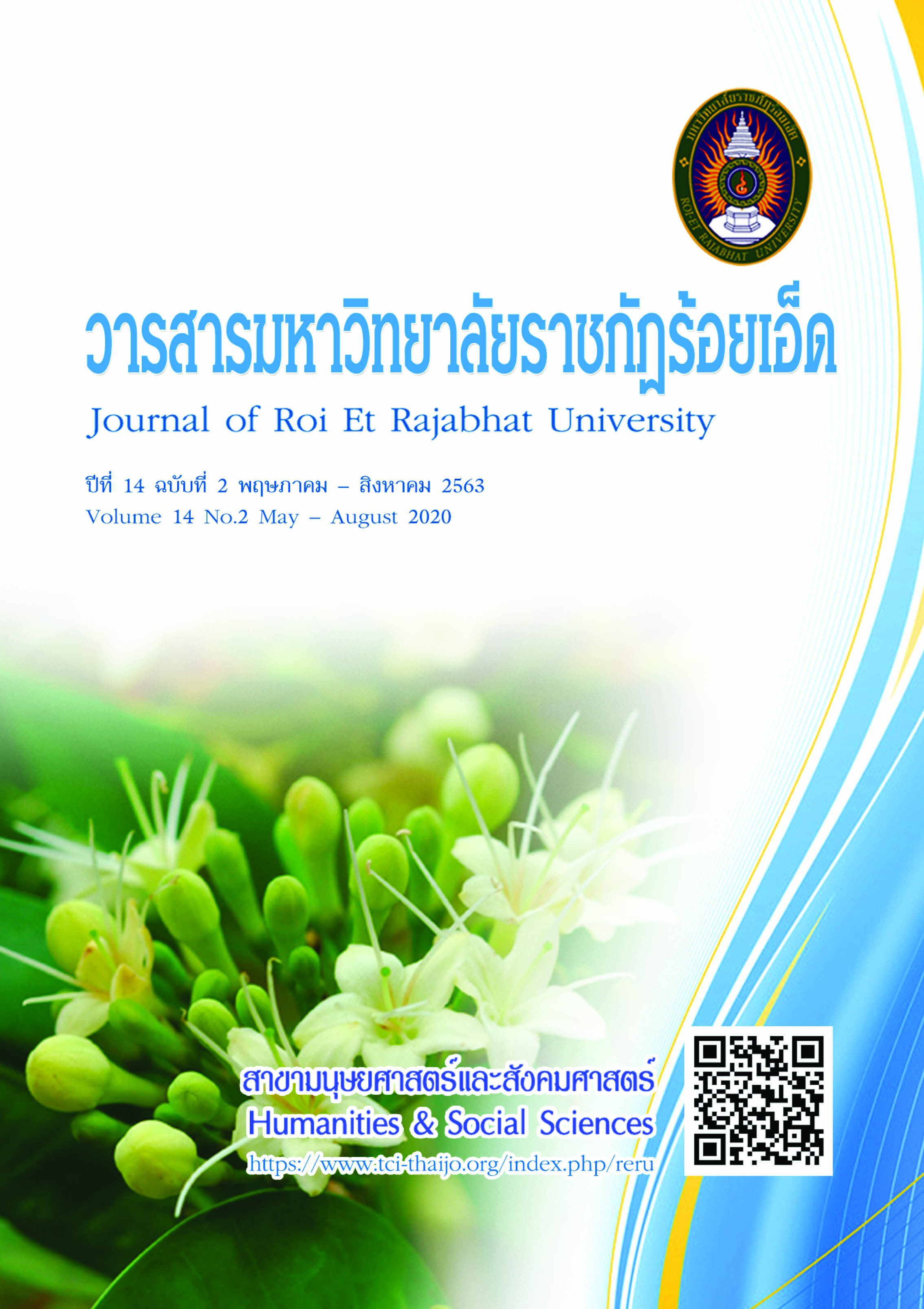The Development of Training Curriculum of Student Librarians for Secondary School Students Under Secondary Educational Service Area Office 22
Keywords:
The Curriculum Development, The Development of Training Curriculum, Student LibrariansAbstract
The purposes of this research were to: 1) develop a training course for student librarians, 2) evaluate the effectiveness of the student librarians training course. This research was divided into 4 steps; studying information, theory and concepts, creating and developing the training course, trying out the training course and evaluating and improving the training course. The samples involve 30 students in students librarian club of Na Wa Pittayakom "That Prasit Prachanukroh", Nawa district under Office of Secondary Educational Service Area 22 in the second semester of academic year 2560 selected by specific selecting method. The inspection of training course was evaluated by 5 experts who focus on monitoring compliance and appropriate components of the course. The instruments for collecting data were interview, test, skill evaluation and questionnaire. Statistics used in this study were percentage, mean (), standard deviation (S.D.) and statistical t-test (t-test for dependent samples). The research found that: 1) The student librarians training course consisted of 4 main elements; the aim of the course, the contents, the training process and the measurement and evaluation. 2) The student librarians’ cognition after training is higher than before the training, statistically significant at the 01 level with very high operational skills. The student librarians’ satisfaction toward the training course is at the highest level (
=4.95).
References
กรุณา พยัคฆชนม์. (2560). การบริหารจัดการห้องสมุดโรงเรียน. สืบค้นเมื่อ 17 มกราคม 2560, จาก www.wachum.com/dewey/000/schl1.com
เด่นกวี ศรีจันทร์อ่อน. (2555). การพัฒนาการดำเนินงานห้องสมุดโรงเรียนดอนจานวิทยาคม อำเภอดอนจาน จังหวัดกาฬสินธุ์. วิทยานิพนธ์ การศึกษามหาบัณฑิต สาขาวิชาการบริหารการศึกษา. มหาสารคาม: มหาวิทยาลัยมหาสารคาม.
ทัศนพรรณ จิรารักษ์. (2558). การพัฒนาหลักสูตรฝึกอบรมเพื่อเสริมสร้างภาวะผู้นำนักเรียนระดับมัธยมศึกษาตอนต้น ในโรงเรียนสังกัดสำนักงานเขตพื้นที่การศึกษา ประถมศึกษาสกลนคร เขต 1. วิทยานิพนธ์ ครุศาสตรมหาบัณฑิต สาขาวิชานวัตกรรมการบริหารการศึกษา. สกลนคร: มหาวิทยาลัยราชภัฏสกลนคร.
นุชนารถ เย็นฉ่ำ. (2554). การพัฒนาหลักสูตรฝึกอบรมยุวบรรณารักษ์ สำหรับนักเรียน ระดับชั้นมัธยมศึกษาตอนปลาย. วิทยานิพนธ์ ครุศาสตรมหาบัณฑิต สาขาวิชาหลักสูตรและการสอน. กรุงเทพฯ: มหาวิทยาลัยราชภัฏเทพสตรี.
ผกาแก้ว แจ้งสว่าง. (2561). โครงการส่งเสริมการอ่านเพื่อพัฒนาการเรียนรู้. สืบค้นเมื่อ 17 มกราคม 2561, จาก http://ascsbest.blogspot.com/2012/04/blog-post_15.html
พิสณุ ฟองศรี. (2549). การประเมินทางการศึกษา: แนวคิดสู่การปฏิบัติ (พิมพ์ครั้งที่ 2). กรุงเทพฯ: เทียมฝ่าการพิมพ์.
บุญเลี้ยง ทุมทอง. (2553). การพัฒนาหลักสูตร. กรุงเทพฯ: จุฬาลงกรณ์มหาวิทยาลัย.
วิชัย วงษ์ใหญ่. (2537). กระบวนการพัฒนาหลักสูตรและการเรียนการสอนภาคปฏิบัติ. กรุงเทพฯ: สุวีริยาสาส์น.
สายสุนีย์ กลางพันธ์. (2558). การพัฒนาหลักสูตรฝึกอบรมผู้นำนักเรียนส่งเสริมสุขภาพในโรงเรียนสังกัดสำนักงานเขตพื้นที่การศึกษาประถมศึกษามุกดาหาร. วิทยานิพนธ์ ครุศาสตรมหาบัณฑิต สาขาวิชานวัตกรรมการบริหารการศึกษา. สกลนคร: มหาวิทยาลัยราชภัฏสกลนคร.
อำภา วังกาฮาด. (2556). ความร่วมมือในการจัดกิจกรรมส่งเสริมการอ่านของห้องสมุดโรงเรียน ในเขตกรุงเทพมหานคร. วิทยานิพนธ์ ศิ ลปศาสตรมหาบัณฑิต สาขาวิชาบรรณารักษศาสตร์และสารนิเทศศาสตร์. กรุงเทพฯ: มหาวิทยาลัยรามคำแหง.
Kerr, J. F. (1989). Changing the a Curriculum. London: University of London Press.
Nicholls, A. (1978). Developing a Curriculum. London: Cox and Wyman.
Taba, H. (1962). Curriculum Development: Theory and Practice. New York: Harcourt, Brace and World.
Tyler, R. W. (1989). Basic principle of curriculum an instruction. Chicago : University of Chicago Press.
Downloads
Published
How to Cite
Issue
Section
License
บทความที่ได้รับการตีพิมพ์เป็นลิขสิทธิ์ของวารสารมหาวิทยาลัยราชภัฎร้อยเอ็ด
ข้อความที่ปรากฏในบทความแต่ละเรื่องในวารสารวิชาการเล่มนี้เป็นความคิดเห็นส่วนตัวของผู้เขียนแต่ละท่านไม่เกี่ยวข้องกับมหาวิทยาลัยราชภัฎร้อยเอ็ด และคณาจารย์ท่านอื่นๆในมหาวิทยาลัยฯ แต่อย่างใด ความรับผิดชอบองค์ประกอบทั้งหมดของบทความแต่ละเรื่องเป็นของผู้เขียนแต่ละท่าน หากมีความผิดพลาดใดๆ ผู้เขียนแต่ละท่านจะรับผิดชอบบทความของตนเองแต่ผู้เดียว





